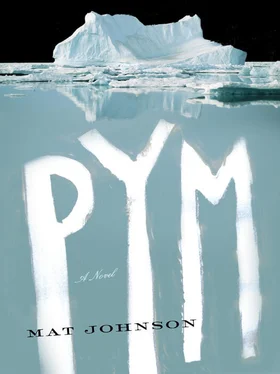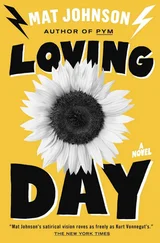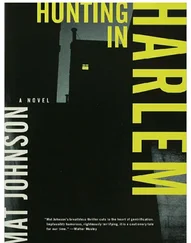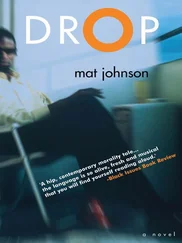“He says the debt must be repaid,” Pym translated. “If you lack the bounty, you can work it off.”
“Work? Well shit, how long will that take?” the captain shot back at him. His voice had risen an octave. There was something about a white man saying you had to work for him that I knew repulsed Booker Jaynes to his core.
“A few hundred cycles.”
“What’s a cycle?”
“The time from darkness to light,” Pym responded, and although his voice still seemed a bit distant, numb, I detected a bit of nervousness on his part as he kept glancing at the beings around him as if to avoid ownership of those words.
“A hundred days? You’re trying to tell us we owe you a hundred days’ labor for a deal that didn’t even go through?” The captain was getting exceedingly agitated at this point. The strain of the past hours, of this improbable discovery and the fate of all that we had left behind had finally overtaken him.
On orders from Khun Knee, the warriors under his control suddenly stood at attention. In response to the elder’s barked command, the soldiers bore arms. Literally bore arms, rolling up their sleeves to reveal horrifically muscled and veined biceps and triceps that seemed as hard and heavy and white as marble.
“Not days.” Angela stared at the approaching soldiers, her voice shaking slightly with each of their steps. “The nights here last all winter, right? And the days the entire summer too. He’s not saying we owe a hundred days of work. He’s saying we owe a hundred years. ” The uncertainty in her lovely voice had nothing to do with her lack of faith in her own interpretation of this contract. It came from a deeper anxiety, one that in that moment fluttered through every black heart in that room.
And thus our slavery began.
* To the horror of both of us, I’m sure.
† Imagine the farthest cloud, on the brightest day, in the bluest sky. Imagine that just past the very top of that cloud was a hard, constructed ceiling. Then imagine how small you would feel under it.
‡ Americans love that last question, “Where are you from?” They see it as an excuse to go on about their peculiar local identity and tell you everything about themselves as people without really offering anything personal at all.
§ My cousin felt that a white liberal was a Caucasian who said to himself or herself every day, “Don’t hate niggers. Don’t hate niggers.” And that the rest of white America’s racial perspective was “Don’t let the niggers hear you say ‘nigger’ out loud.”
‖ Still talking.
a Let me assure all who inquire that I did spend time considering this image later. At the moment it didn’t seem possible. None of it did.
I am bored with the topic of Atlantic slavery. I have come to be bored because so many boring people have talked about it. So many artists and writers and thinkers, mediocre and genius, have used it because it’s a big, easy target. They appropriate it, adding no new insight or profound understanding, instead degrading it with their nothingness. They take the stink of the slave hold and make it a pungent cliché, take the blood-soaked chains of bondage and pervert them into Afrocentric bling. Parroting a vague “400 Year” slogan that underestimates for the sake of religious formality. What’s even more infuriating is that, despite this stupidity, this repetitious sophistry, the topic of chattel slavery is still unavoidable for its American descendants. It is the great story, the big one, the connector that gives the reason for our nation’s prosperity and for our very existence within it. But still, aren’t there any other stories to tell? So many have come to the topic of slavery because they think the subject matter will give them gravitas, or prizes, or because they find comfort in its familiarity. To be fair, something so big (nearly 20 million slaves kidnapped), for so long (from A.D. 1441 until the end of the nineteenth century) is nearly impossible to dance gracefully with. But still. That is the source of my love for the slave narratives: they are by their nature original , even when they draw on the forms of earlier literary sources. They are never duplicitous, because they all have one motivation: to document the atrocity of chattel slavery and thereby assist in ending it. Their artistry is surprising, considerable, devoid of pretension and with passion in its place.
Turns out though that my thorough and exhaustive scholarship into the slave narratives of the African Diaspora in no way prepared me to actually become a fucking slave. In fact, it did quite the opposite. The amount of real manual labor these prehistoric snow honkies expected me to do was insane. *The day after it was revealed that we had no connection to the outside world, and worse still of course that the outside world might not exist anymore, the Tekelians came for us. We had spent the night discussing our situation as Jeffree and Carlton Damon Carter kept trying to contact the mainland, trying to get someone on the radio, thinking as much of our own situation as of that of the rest of humanity. Nothing. They found nothing — no email, no text, no call. No signal, no satellite. At first it seemed like it was just a delay. After a while, the dread grew. There was nothing out there. And then, after hours of desperation, came the banging on the outer door. Slow but hard. Steady. Unavoidable.
Gathering our warmest garments, we were forced to leave behind all but what we could carry, as the hulking Tekelians insisted that we follow them on foot. Even my most prized possession, Dirk Peters’s antique skeleton, which I kept in an oily green canvas sack, had to be left behind in my room for now. Given minutes to reduce our belongings, unsure of how long our stay was to be, excess baggage and clothing were thrown across our break room floor.
“Don’t let fear take hold of you. We go into the unknown but not the unconquerable,” Booker Jaynes addressed the now downturned heads of his crew. I tried to take my cousin’s advice, but I wasn’t sure if I could carry the load with his flinty determination. Each of us had been withdrawn all night, whispering our private concerns and suspicions, I with my cousin, Angela with Nathaniel, the engineers in their coupling. Gone was Garth Frierson, who after the situation of our being forced into servitude by our creditors was revealed, quietly removed himself from the ensuing discussion. I saw Garth whispering for a few moments with Pym, but thought little of it at the time, or truly of Garth in general for the rest of the stressful night. At half past three in the morning, giving up on the hope of intercepting a radio signal from the world to the north, I passed Garth’s door on the way to my own. Stopping in the hall, I was struck at that moment not by what I heard from his room but by what I didn’t: no snoring. Garth suffered from the worst sleep apnea I had ever heard, his bass snores started loud and then built toward industrial levels before waking him for a few seconds of lip-smacking incoherence before repeating the chorus. But there was no such solo; instead I heard movement, and the crinkling of more wrappers than I was willing to imagine. Despite my suspicions, morning revealed that the sound was not the product of an epic preslavery pig-out, but was the sound of strategy. As the rest of us did the last of our zipping and the massive Tekelian warriors crouched in our low-ceilinged break room as they waited to take us away, Garth appeared before us comparatively unclothed. Dressed in just his bathrobe and long johns, the big man held before him a large box, a box I immediately recognized as one of the bulk containers of Little Debbies from his storage unit. Not looking at us, and particularly not looking at me, Garth lumbered over to the closest and the largest of the shrouded guards and handed the freight to him. The guard, for his part, took the gift without bark, concealing it within his robes as if it had never been there.
Читать дальше












